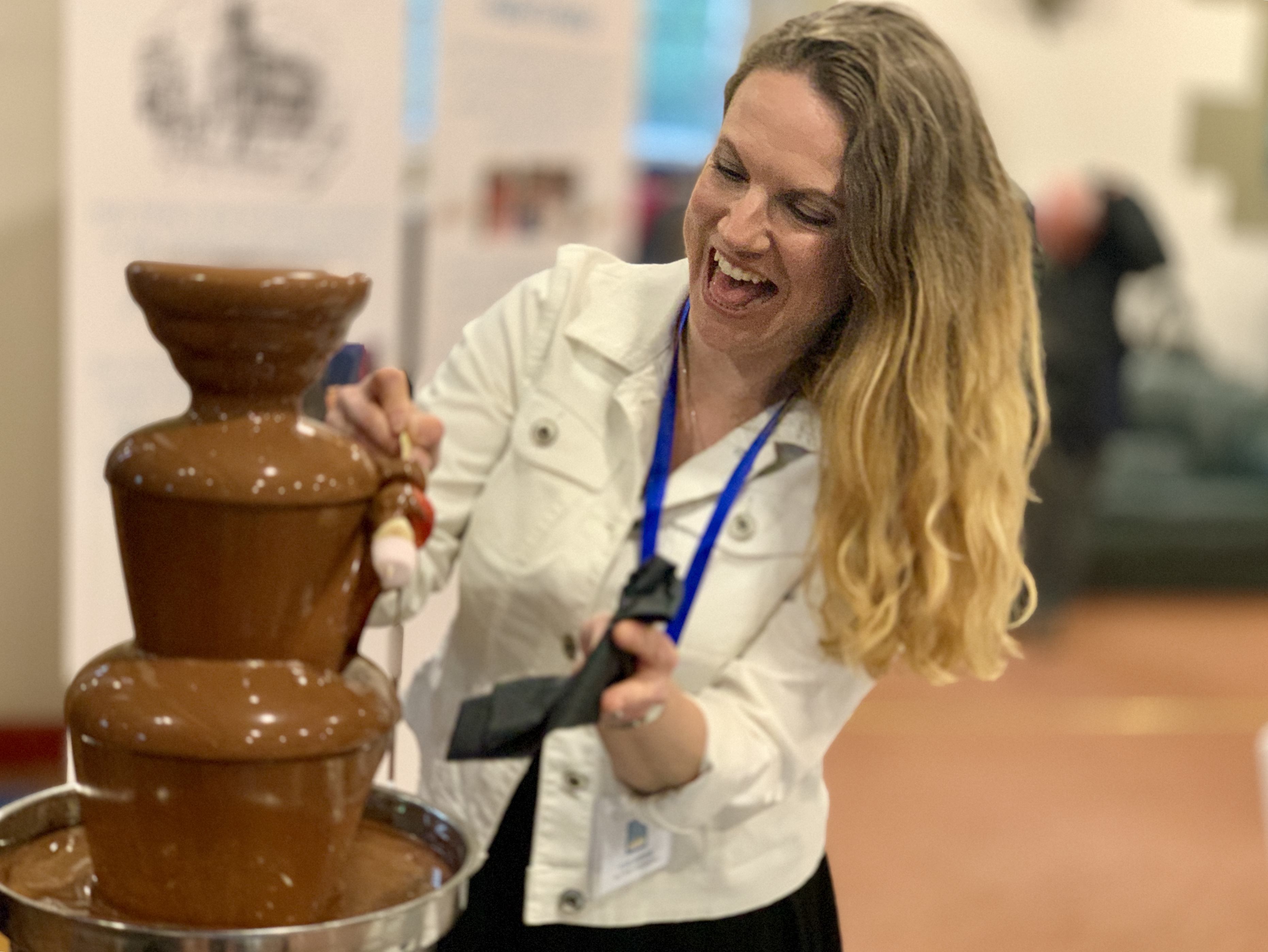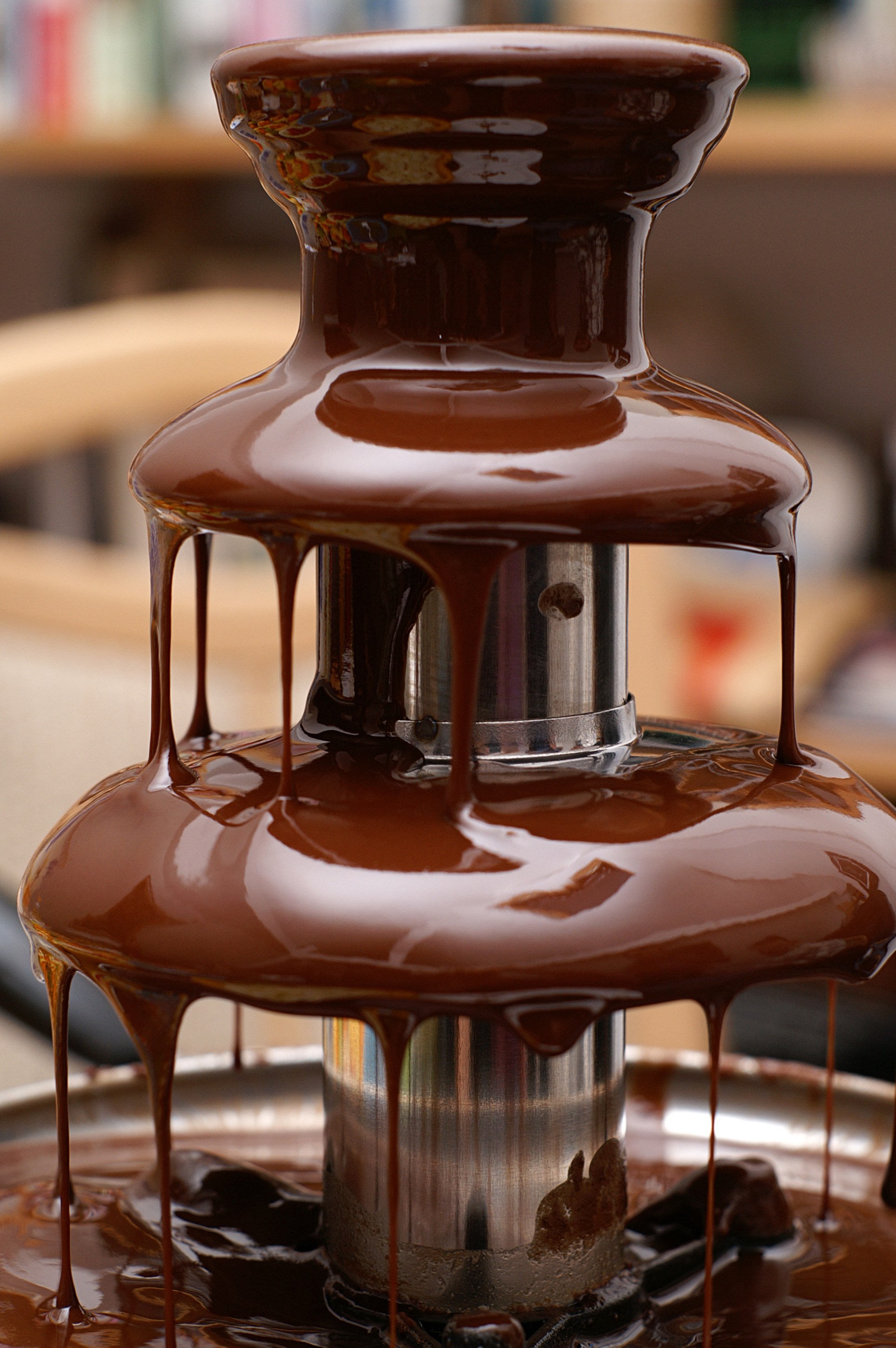Few sights can rival the spell of a chocolate fountain. It’s theatre, chemistry, and emotion in motion a shimmering curtain of liquid chocolate that seems to defy gravity.
But behind the spectacle lies a precise balance of science and craft. When that balance is right, the result is more than dessert it’s a sensory journey.
On my Chocolate Safari® experiences, I often say that chocolate is alive: it listens, it flows, it reacts. A fountain becomes its stage where flavour, texture, and feeling meet.
The Science Behind the Flow
A perfect fountain depends on more than a good machine. It starts with chocolate built for flow couverture with at least 35% cocoa butter. This extra fat ensures a smooth, even cascade and releases the delicate aromas trapped in the cocoa solids.
Melt temperature: 40–45 °C
Operating temperature: 30–32 °C (milk and dark) or 28–30 °C (white)
If the chocolate runs too cool, it thickens and clings. Too hot, and it loses temper and flavour nuance. The goal is a gentle, silky fall not a fast-moving torrent.
Think river, not waterfall On my Chocolate Safari® experiences, I often say that chocolate is alive: it listens, it flows, it reacts.
Choosing Your Chocolate
Your choice of chocolate determines your fountain’s story.
Dark elegant, aromatic, and slightly bitter; ideal for fruit skewers and grown-up palates.
Milk creamy, balanced, crowd-pleasing; pairs beautifully with marshmallows or strawberries.
White gentle, sweet, and visually striking; a blank canvas for natural colour or fruit purées.
Whenever possible, use fine couverture or single-origin chocolate. You’re not simply feeding guests you’re introducing them to a flavour geography.
Ghana’s warmth, Madagascar’s berries, Ecuador’s florals all flow through the cascade when the chocolate is treated with care.
The Sensory Safari: Look, Touch, Listen, Smell, Taste
Every fountain has a rhythm, and every sense plays its part. Here’s how to truly experience it my Chocolate Safari® method, adapted for events.
Look Watch how the chocolate falls,does it flow in a smooth sheet or break into droplets? The sheen tells you about the cocoa butter content; the colour hints at roast and origin.
Touch The real touch happens in the mouth. Does it coat the dippable evenly? Does it melt cleanly on the tongue, or leave a waxy film? Particle size and conching determine that silky feel.
Listen A fountain in tune hums softly. The steady whisper of falling chocolate tells you viscosity is perfect. Harsh splattering or uneven sound suggests imbalance or trapped air.
Smell Close your eyes and breathe. The rising warmth carries cocoa volatiles nutty pyrazines, fruity esters, sometimes a whisper of caramel. Aroma is 80% of flavour, and a good fountain is its own diffuser.
Taste Finally, taste consciously. Begin with something neutral (a simple cube of sponge or banana). Let it melt, then notice the flavour journey: entry, mid-palate, and finish. Each tells a story of fermentation, roasting, and craft.
Creating Flavour Theatre
The best fountains don’t just feed people they invite participation.
Use lighting to highlight the sheen of the chocolate and aroma cues (a small fan can gently waft scent across the room) pair your chocolate with complementary textures: crisp, soft, salty, fruity.

For a true sensory arc, introduce a flavour flight:
1. Start with dark chocolate & pineapple fruit acids cut through richness.
2. Move to milk chocolate & pretzel sweet meets salt.
3. End with white chocolate & raspberry visual and aromatic harmony.
Encourage guests to take their time. Flavour has rhythm; rushing flattens it. A good fountain is more like a tasting table than a buffet
Troubleshooting with the Senses
|
Problem What You’ll See |
What You’ll Hear |
What to Do |
|
Chocolate too thick |
Flow looks sluggish Low, intermittent hum |
Add small amounts of melted cocoa butter; gently stir |
|
Flow interrupted Gaps or splashes |
Gurgling noise |
Check for air pockets; Turn off wait then turn back on level the base |
|
Overheating Dull surface, scorched smell |
Bubbling, popping |
Turn off heat immediately; cool and re-temper and adjust temp setting |
From Bean to Cascade
Every fountain performance begins long before the chocolate reaches the machine.
Fermentation, drying, roasting each stage builds the precursors that will later bloom in your fountain’s aroma.
When I work with cocoa farmers on my Chocolate Safari® training programmes, I remind them that flavour is born on the farm, not in the factory.
Respect for those origins turns a simple dessert display into a moment of connection. When guests taste, they’re not only enjoying the spectacle they’re meeting the farmer, the fermenter, the roaster, and the maker through every drop.
Safari Challenges: Engage the Senses
Turn your fountain into an experience guests will remember. Try these:
Flavour Mapping Invite guests to identify fruit, nut, or spice notes in the chocolate and match them to the Cacao of Excellence flavour wheel.
Taste with Colour® Moment Lay out coloured cards (reds for berries, yellows for citrus) and ask which hue the chocolate evokes.
Sound Check Have someone close their eyes and describe what the fountain “sounds like.” Smooth? Bubbling? Whispering? Their description reveals their sensory connection.
Flavour Memory Wall Encourage guests to write one word describing how the chocolate made them feel joy, comfort, nostalgia. Flavour is emotion; let people articulate it.

